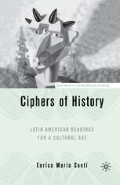Abstract
The release, in 1993, of the popular Cuban film Strawberry and Chocolate, by directors Tomas Gutierrez Alea and Juan Carlos Tabio and with a script by Senel Paz, occasioned a lively debate about its content and significance. The debate was in itself predictable, given both the subject of the film—the sentimental education of two Cuban men, one gay and the other straight—and the specific circumstance in which the film was produced—the so-called Cuban “special period” following the collapse of Real Socialism in Europe and thus in the middle of the worst crisis the Castro regime faced in its then 38-year history Whereas outside of Cuba the film was hailed as further evidence that perestroïka had reached the island and the Castro brothers were finally releasing their grip on dissidence, within the Cuban community, both in the island and among exiles, the film sparked conflicting opinions. Some viewed it as an unwitting critique of the Cuban State’s long-standing repression of gays; others saw it as manipulative, further proof of the regime s ongoing deception about its actual policies, particularly at a moment when it was attempting to win over allies abroad in order to resolve an economic and political crisis. The debate appeared to reach a climax when the film was bought up by Miramax for U.S. distribution and nominated for the Oscar for best foreign film. And it appeared to resolve itself when the film lost out to no less than Russia’s entry in the same contest.
In memory of four Brothers: Armando Alejandre, Jr., Carlos Costa, Mario de la Pefia and Pablo Morales
Access this chapter
Tax calculation will be finalised at checkout
Purchases are for personal use only
Preview
Unable to display preview. Download preview PDF.
Notes
All references are to Strawberry and Chocolate [Fresa y chocolate], a film by Tomas Gutiérrez Alea and Juan Carlos Tabio. A production of the Cuban Institute of the Arts and Films Industry (ICAIC), coproduced by IMCINE and Tabasco Films-Mexico, Telemadrid and SGAE-Spain; 104 minutes. The film is based on a story by Senel Paz, “El lobo, el bosque y el nombre nuevo,” Union (Edición Continental), I (1991), 25–35
Nedda G. de Anhalt, “Eróica, exóica y estrambñca,” Voces y refles, vol. 3, no. 9 (1994), 51–56
Dennis West, “Strawberry and Chocolate, Ice Cream and Tolerance. Interviews with Tomas Gutierrez Alea and Juan Carlos Tabío,” Cinéaste, vol. 21, nos. 1–2 (1995), 16–20
For an overview of these issues, see Grupo de Trabajo, Memoria, Verdady Justicia, Cuba: la reconciliation national (Miami: Centro para America Latina y el Caribe, Universidad Internacional de la Florida, 2003).
For contrasting readings of the story see Emilio Bejel, “Senel Paz: homosexualidad, nacional-ismo y utopia,” Plural, 269 (February 1994), 58–65
Peter Brooks, The Melodramatic Imagination. Balzac, Henry James, Melodrama and the Mode of Excess (New Haven: Yale University Press, 1976), 14–15.
Caryl Flynn, Melodrama: Stage, Picture, Screen, Ed. Jacky Bratton, Jim Cook, Christine Gledhill (London: British Film Institute, 1994), 108.
Copyright information
© 2005 Enrico Mario Santí
About this chapter
Cite this chapter
Santí, E.M. (2005). After the Revolution: Strawberry and Chocolate, or the Politics of Reconciliation. In: Ciphers of History. New Directions in Latino American Cultures. Palgrave Macmillan, New York. https://doi.org/10.1007/978-1-137-12245-2_7
Download citation
DOI: https://doi.org/10.1007/978-1-137-12245-2_7
Publisher Name: Palgrave Macmillan, New York
Print ISBN: 978-1-4039-7046-6
Online ISBN: 978-1-137-12245-2
eBook Packages: Palgrave Social & Cultural Studies CollectionSocial Sciences (R0)

